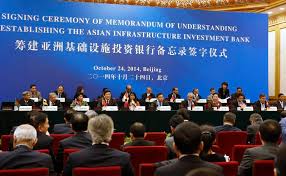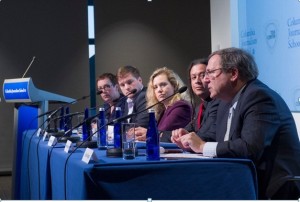By Uchenna Ekwo
In his now infamous conference call to his top donors, Mitt Romney the Republican presidential candidate in 2012 concluded that President Barack Obama won re-election because he gave “gifts” to Latino Americans, African Americans, women and young people generally. In a similar line of thought, the leading conservative voice and popular radio talk show host Rush Limbaugh described Obama as Santa Claus whose generosity to a certain class of voters earned him re-election.
For all the talk of Obama’s gifts and generosity, Africa is yet to benefit from his lavish giving and no time can be more appropriate than the golden jubilee anniversary of Africa Union.
It is ironic that to date, Obama’s predecessor, President George W. Bush has a better record of giving to Africa. Under President Bush, the United States in 2003 announced the President’s Emergency Plan for AIDS Relief (PEPFAR) that would provide $15 billion to Africa over five years. In the view of some analysts, this represented the largest single effort by any nation targeting a specific disease. Bush also launched the President’s Malaria Initiative (PMI) with the goal of reducing malaria-related deaths by 50 percent in selected 15 African countries. The Bush presidency also persuaded the G-8 nations to embrace the multi-lateral debt relief initiative (MDRI), which encouraged the IMF, World Bank, and the U.S. to reduce the debt burden of highly indebted poor countries. The Bush administration’s Millennium Challenge Corporation, an independent U.S. foreign aid agency, committed $3.8 billion to nine countries in Africa between 2008 and 2013. He also backed programs to cancel $34 billion worth of debt for 27 African states.
This array of support to Africa sounds like a gift to me and probably comes close to Mitt Romney’s reference to Obama’s showering of gifts to his supporters and admirers. So far, Africa looks forward to benefitting from Obama’s giftmania. In four years, Africa remains a footnote in Obama’s administration.
President Obama only visited Africa for no more than 20 hours – to Ghana where he addressed the parliament and to Cairo, Egypt where he sought to regain the support of the Islamic world. So far the Obama administration has spent about $ 6.8 billion in Sub-Saharan Africa out of which less than $1 billion was invested on public health. The administration recently unveiled its Africa policy framework in June 2012 entitledU.S. Strategy toward Sub-Saharan Africa. In the seven page document, the administration set forth its goals in Africa primarily through strengthening democratic institutions, stimulating economic growth and investment, advancing peace and security, and promoting opportunity and development.
In the document, Obama did not suggest any “gifts” to the continent that gave birth to his father. Was that an omission? Could Mitt Romney who knows how generous Obama can be remind him that he has forgotten his ancestral home in doling out the largesse of US resources?
In reality, there is a growing whisper among Africans about Obama’s lack of interest in Africa. The influential Mo Ibrahim, the Sudanese telecommunication billionaire was once quoted as saying that “I don’t think President Obama gives much thought to Africa — or gives much to Africa”. Ibrahim who instituted the annual $5 million prize money for good governance award to African leaders probably spoke the minds of millions of Africans who expected so much from their “brother”, who’s president of the United States of America.
Given my understanding of American politics and unique circumstances of Obama’s presidency, I often come to the defense of the administration when it comes to its limited support to Africa. First, it would have been political suicide for Obama to give Africa the required attention because it would be a fodder for his detractors. Being the first black man to occupy the White House, any overt and sustained commitment to the land of black people – Africa would have sent a wrong signal to Americans who are yet to overcome intense racial prejudice among the citizens.
Secondly, the economic challenges that confronted the administration from the very beginning were such that President Obama could not have paid attention to any other thing. The domestic challenge was such that foreign policy issues took a back seat.
Thirdly, the power of an American President is terribly exaggerated. The limits of the president are not like most presidents in Africa who violate the constitution arbitrarily and get away with it. Therefore, there is a lack of understanding both of how the system of checks and balances works – or doesn’t work any longer. The partisan gridlock and the unprecedented opposition from the Republican Party would have made it impossible to help Africa the way he would want. Africans may blame Obama for not helping to alleviate many of their problems but the fact is that they don’t understand the limits of his powers.
Now that Obama has secured a second term in office; there is the likelihood that he can focus more attention to Africa. Should he decide to shower Africa with “gifts” similar to those Mitt Romney blamed for his electoral loss, my fear is that nearly 920 million citizens of continental Africa will not have enough share of the “gifts”. It is in this connection that I agree with Dambissa Moyo, the International Economist who criticizes western financial aid to Africa. In her book, Dead Aid Moyo argued that in the past fifty years, more than $1 trillion in development-related aid has been transferred from rich countries to Africa and yet the recipients of this aid are not better off as a result of it.
Consequently, the “gifts” Obama should give to Africa as it turns 50 in May next year are two folds: pay a state visit to some African countries notably Kenya, Nigeria, South Africa, Tunisia, and Cameroon with less fanfare and support investment in human capital. When Obama embarks on a state visit to Africa, it will be more rewarding to make it a fact-finding tour than a window-dressing exercise. Many African leaders are wont to playing to the gallery and will put up their best appearances including patching up pot holes on the road he is expected to pass through. He should alter the planned activities to visit unexpected places to get a real picture of the needs of the people. I say this because if any foreign leader visits a country like Nigeria and limits his/her tour to Abuja, that leader will go home with the erroneous impression that Nigeria is not a Third World after all. Such a leader will never know that there are people who live under thatched buildings and barely eke out a living.
On the issue of investment in human capital, it is gratifying that the new U.S. Strategy toward Sub-Saharan Africa emphasizes the importance of engaging Africa’s young leaders. Clearly, the future of Africa lies in the hands of its youth population. But, sadly enough, the youth population is undermined by the ruling elite that perpetrate gerontocracy in the continent. A good number of the youths lack good education and therefore unable to compete in the 21st century knowledge economy; the universities are poorly funded, ill-equipped, and centers of mediocrity.
The “gifts” Obama should give to Africa in his second term and historically at the continent’s 50th anniversary should be in the area of empowerment of young people through support for sound education. This is because a sound education opens the doors of opportunities and supports a mental framework toward progress in every facet of human endeavor.
In the final analysis, Mitt Romney may have received lots of criticisms for suggesting that Obama won re-election by offering “gifts” to voters, I am sure that if Africans were allowed to vote for him to receive “gifts”, millions of votes more would have gone to Obama’s column. The reality is that only American citizens are eligible to vote in elections which outcome has international ramifications. Africans may not have voted for Obama but they recognize that he is their “son”. And in accordance with the custom and tradition of Africa, a son is expected to play a leading role in supporting his father’s house or society. That support is the greatest “gift” Africa wants from Obama.
Dr. Uchenna Ekwo is a public policy analyst and President of New York-based Center for Media & Peace Initiatives. He is also an Associate Professor, School of Public Affairs and Administration, Rutgers University, Newark, New Jersey. Email:uchenna@167.99.239.142





